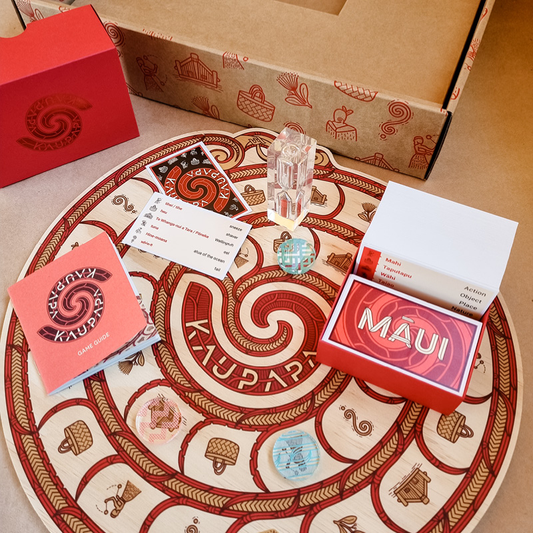On board with language.
Covid-19 saw a resurgence of interest in board games with several new products emerging but none so unique to New Zealand as Kaupapa, devised for a bilingual Aotearoa and suitable for speakers and learners of te reo Māori. HELEN PERRY spoke to the creators.
Kuruho Wereta (Ngāti Raukawa, Ngāti Toa Rangatira, Te Ati Awa, Ngāti Kahungunu) and Rosie Remmerswaal (Pākehā) met by chance nearly three years ago when both were visiting friends at Umupuia Marae. They didn’t know then they would become friends, flatmates, and the instigators of a word description game aimed at helping anyone learning te reo Maori.
However, in little more than two months they were sharing premises and ideas to help Rosie learn te reo Māori from scratch and for Kuruho to discover a new love for the language he had grown up with.
KW> “I grew up in Ōtaki, well known for its strengths within te reo Māori, and had a bilingual and bicultural upbringing. As I matured, I felt the desire to expand my experiences and so I left Ōtaki to pursue a career as a Ranger. I always maintained a strong connection to my Māori arts background through carving and weaving, but didn’t have many opportunities to kōrero Māori everyday.”
On the other hand, Rosie, with Pākehā, Dutch, Irish and Swedish ancestry grew up with very little reo Māori.
“However, as I learnt more about my role as a Pākehā upholding Te Tiriti o Waitangi, I wanted to learn,” she says.
And, learn she did; with startling pace and fluency.
“It’s a beautiful language, and a vessel for ways of thinking, wisdom and worldviews which have arisen from this very place that we’re blessed to call home. The more I learn, the more passionate I become about supporting Māori culture, reo, and ultimately, tino rangatiratanga.”
Serious talk, but it was this desire that set her on her new learning path with Kuruho’s encouragement. Although he has recently returned to live and work in his home town of Ōtaki, since bringing their game project to fruition, the pair are still working closely together, expanding their newly formed organisation, Kura Rēhia.
“Over time, our flat in Maraetai became more and more bilingual. Kuruho would teach me about whakataukī (Māori proverbs) and I’d share new things I was learning with him” says Rosie. Kuruho was inspired to take his reo to the next level, and took up night classes.
“One night we were playing a board game and decided to try negotiating the English words using te reo Maori. It was fun, but so clumsy, so we created a similar word game by cutting up pieces of paper and hand writing our own clues in te reo Māori.”
Subsequently, they both took this basic version of Kaupapa to their reo Māori classes and received enthusiastic responses. It prompted them to explore further.
Over the next two years the friends continued to develop the word game so that it could be played at any language learning level – beginners can use it to learn new words while fluent speakers are able to create a fast-paced, playful Maori immersion game.
KW> “The design and feel of the game has evolved over many renditions. The design we landed with is inspired by the patterns found in nature and pūrākau (traditional narratives) as expressed in whakairo (carving) and weaving, such as haehae, pākati, waewae and taratara ā Kae. There are stories and meanings deeply rooted into the foundation of these patterns.”
In 2020, the friends founded Kura Rehia with the aim of creating more games, resources and events for a bilingual Aotearoa.
Working closely with graphic designer Aroha Tamihana (Maimoa Creative) and translator, Hēmi Kelly, they chose environmentally responsible, independent New Zealand company, Soar, to manufacture the game.
It was formally launched in early May at Umupuia Marae in Maraetai where the pair met, down the road from the flat where the game began.
Having poured heart and soul into organising the ‘Te Reo o te Rēhia’ launch event, these entrepreneurs are now keen to expand their reach and make the game available in a broad range of organisations and environments.
“There is enthusiasm from libraries, kura (schools) and community groups, who like us, see te reo as vital to how we have fun together as whānau and friends” Rosie says. “We would like to continue developing fun resources for speakers and learners of te reo Māori”
“The world can be so serious and difficult to navigate at times,” Kuruho says, “and there’s a lot of mahi for all of us as Tiriti partners in Aotearoa. However, there are kura huna (hidden treasures) in the act of play. When we play, our neural pathways can expand at a rapid rate, this creates a space for deep learning to take place in a form that is disguised as fun, and it’s very healing. Our mission is to support Aotearoa to become an authentically bilingual nation where everyone can thrive.”
Check out the cover feature article in Eastlife Magazine.





